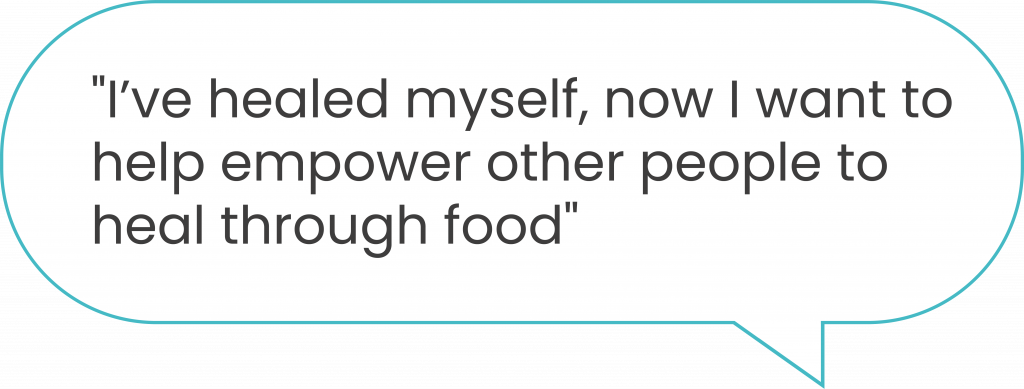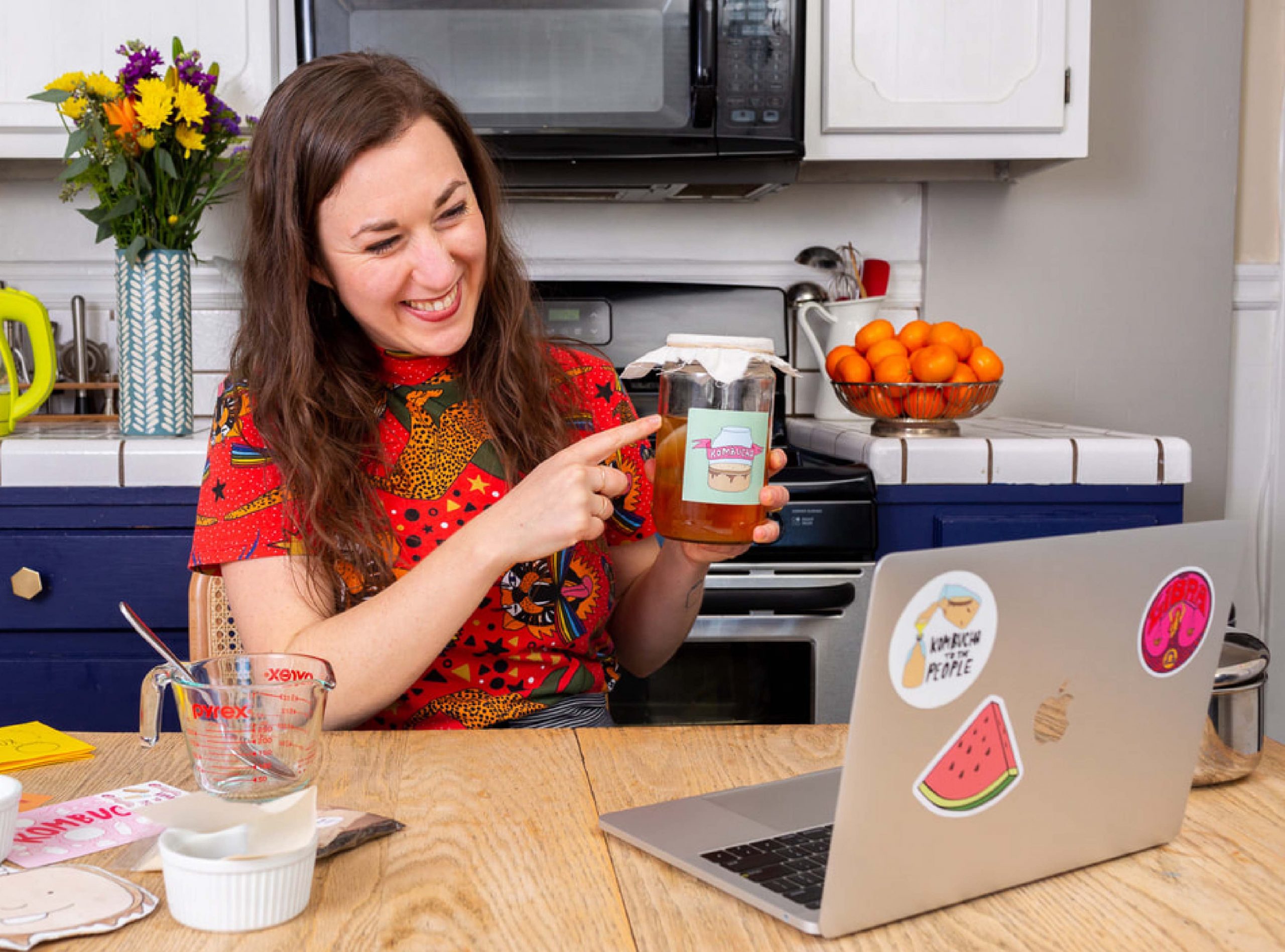We recently sat down with Certified Nutrition Consultant Lila Volkas to discuss the impact food has on the body, how she discovered this through her health and wellness journey, and how she is using that knowledge to bring joy and connection to employees through her corporate team-building workshops.
How did your journey into health and wellness begin?
Lila Volkas: My entry into the wellness world was first through fitness. I became an indoor cycling instructor in college and then later a yoga instructor. I loved the energy of group exercise and I had so much fun creating playlists and making creative workouts.
I started getting into nutrition when I got my first kombucha brewing organism in 2012 which sparked the thought ‘wow, kombucha makes me feel good and I can make it myself!’ Shortly after I became obsessed with making different flavors of kombucha myself, I started teaching others at my college’s student food co-op.
What has been the most impactful part?
Lila: In 2015 I went through a health crisis. I had just moved after graduating college and was feeling really stressed. I was tired all of the time, then I started having skin rashes, and digestive issues, and it felt like my body just kind of broke. I was managing so much discomfort and pain that I felt all I could do was focus all of my efforts on healing my body. It took me years to unravel and figure out exactly what was going on. I sought the support from many different health practitioners, from conventional dermatologists to acupuncturists to naturopaths. I discovered that my blood sugar was imbalanced, I had food sensitivities, and needed major digestive support.
Eventually, I found so much healing through food, which inspired me to go back to school to become a holistic nutritionist. I thought ‘ I’ve healed myself, now I want to help empower other people to heal through food.’

Can you talk a little about how food can affect our mood and overall wellness?
Lila: I believe that all foods are welcome and I never want to demonize any particular ingredient. I think it’s about being an educated and empowered consumer over adhering to strict food rules. Sometimes I eat chocolate cake even though the gluten in it gives me a rash, but I’m making that choice and I know the impact.
When thinking about food and mood, blood sugar plays a much bigger role than we might expect. Blood sugar is the amount of glucose present in our blood, and it naturally fluctuates throughout the day with our food, physical activity, hormones and other factors. If we are having giant glucose spikes caused by our diet, then we are going to experience the impact. Low blood sugar can cause more anxiety, energy crashes, and cravings. Some other signs of blood sugar dysregulation are brain fog, feeling hangry, not being able to concentrate, or feeling tired. These are all things people may navigate every day, but they may not be connecting it to what they’re eating. So one question is: if people shift their diet, can they make those symptoms go away?
Our bodies are made up of what we eat, so choosing the highest quality fuel that is accessible is important. For example, our cell membranes are made up of fat. Do you want the majority of that fat to be from whole food sources like avocados and olive oil, or from more processed and refined foods? I try to consume the majority of my food in their ‘whole food forms’ aka as close to how they are found in nature as possible. Think corn on the cob versus corn chip.
Do you have any tips or “words of wisdom” for individuals who are considering starting, or are already on, a health journey?
Lila: Many people don’t realize that they could be feeling better because they have been feeling crummy for most of their life. That was definitely me before I examined how what I was eating was impacting my symptoms. To start, I would pay attention to your blood sugar, how your digestion is doing, and how much water you are drinking. If someone is looking to eat healthier, I always suggest incorporating more whole food ingredients into their diet. I also love starting folks out by making changes for one meal or snack a day, so they don’t get overwhelmed.
Some “words of wisdom” I follow when it comes to nutrition and wellness:
- Listen to your body – Sometimes we need to remove some layers to figure out the root cause of an issue, but you know your body best. It isn’t my role, as a holistic nutritionist, to tell you exactly what to do, but rather to give you the tools to listen to your own body and make educated decisions.
- Bio-individuality – Everybody is different, and with that, every BODY is different. Acknowledging that everyone has different needs, and something that worked for one person won’t necessarily work for you.
- Experiment – Try on different foods and eating styles, or slightly switch up your current diet and see how those changes make you feel, mentally and physically.
Speaking of kombucha, do you have a name for your SCOBY?
Lila: To be clear, a SCOBY is an acronym for a symbiotic colony of bacteria and yeast aka the slimy pancake in a kombucha jar. My SCOBY’s name is Sheila! She’s definitely a prolific “mother,” I have shared layers of my kombucha organism with thousands of people all over the world over the last ten years.
From my years of experience teaching kombucha workshops, I believe it provides a really unique and connected team-building experience. It’s special because the SCOBY creates an invisible web that connects everybody who brews with it. Teams who take my kombucha brewing workshop are not only connected through working at the same company, but they are also connected because they share the same kombucha organism!
Instead of it just being a one-time event, companies are provided with a living organism that creates a culture of wellness while teaching people a new skill. I had a client reach out to me a year after their workshop letting me know they had a company Slack channel dedicated to updates about employees’ kombucha all made from Sheila!
Wow, the team kept up with it even after a year! Is it really possible to make an impact on employees in just one workshop or class?
Lila: My goal is to make things simple and practical. I know that not all companies have the budget to book multiple events, so I structure all of my classes to be accessible, fun, friendly, and have actionable takeaways for participants even if we only meet once. At the end of every workshop, I love going around and asking people what information nuggets they are going to incorporate into their lives to see what resonated with them.
As August Wellness Month comes to a close, what are the benefits of wellness programs in the workplace? Do you have any recommendations or advice for companies interested in starting wellness programs for their employees?
Lila: I think that integrating wellness and self-care into the workplace is so important because we can get stuck into a mindset where productivity is prioritized over being healthy. Building a culture of wellness in your company acknowledges to your employees that it’s okay for them to be human. For companies just starting out, I think it’s important to figure out what your team wants and what they would benefit from. For example, I may work with a company that’s predominantly software engineers who want to focus on brain health, but then I work with other companies whose employees struggle with managing stress. If possible, I would suggest doing a 3-part series where we are building on the basics to create a deeper understanding of nutrition concepts. A few ways to offer wellness workshops are: during wellness months, holidays, for company-wide health initiatives, or during regularly scheduled “lunch and learns.”
Of course, we have to end on food, what are some of your “must have” ingredients in your kitchen or dishes that make you feel your best?
Lila: I would say the thing that made the biggest shift in my life was to start the day with a savory breakfast. My favorites are grain bowls and breakfast tacos. Like most Americans, I grew up eating cereal, toast, muffins, and pancakes. These foods on their own did not have enough nutrients to power me for the morning. I would be hungry an hour later, feel tired, and crave sweets. Shifting to a savory breakfast that focused on a high protein intake has literally changed my life. It allows me to feel more energized and listen to my body’s needs more clearly.
Having snacks with high-quality protein is very important for me. I know that salmon jerky is going to give me the energy I need versus a granola bar. I’ve also been really into these chickpea snacks lately, legumes are a great source of plant-based protein if you don’t eat meat.
I also love kombucha. It makes me feel energized, provides my gut with healthy bacteria and feels like a tasty special beverage. I have a big sweet tooth, so I’m always on the hunt for something to satisfy that while still fueling my body. My avocado chocolate mousse is a really great healthy dessert and is a perfect mood booster. It’s made from avocados that help support the fat needed for our brains. It also has chocolate which is full of antioxidants, the cell-protective qualities that come along with our food. So we are helping our brains and protecting our cells, all in one creamy delicious dessert!
Nutritional Highlights:
Avocado: High in fiber and rich in healthy in saturated fats. Avocados contain a wide variety of vitamins and micronutrients; among them are the antioxidant Vitamins C and E; Vitamin K, which aids calcium absorption; potassium, which may regulate blood pressure, and lutein which appears to protect eye health; and folate, an important B vitamin. The avocado’s nutrients reduce inflammation and help lower levels of LDL (bad) cholesterol.
Cacao: A superfood that contains a plethora of antioxidants. The flavonoids, sulfur, and magnesium of cacao help protect against cancer and cardiovascular disease. Heating and processing cacao, unfortunately, kills many of these nutrients, so this is why raw avocado mousse is a great way to enjoy cacao’s benefits.
Coconut milk: Contains health-promoting medium chain saturated fats and has antiviral, antibacterial, and antiprotozoal properties.
Goji Berries: Boosts the immune system with their high vitamin C, vitamin A, and antioxidants. They also help maintain blood sugar and are very well known in Traditional Chinese Medicine.
Interested in booking a wellness session with Lila? Click here to learn more about the corporate wellness virtual classes offered through Cater2.me!
Lila Volkas is a Certified Nutrition Consultant and workshop facilitator based in Berkeley, California.











